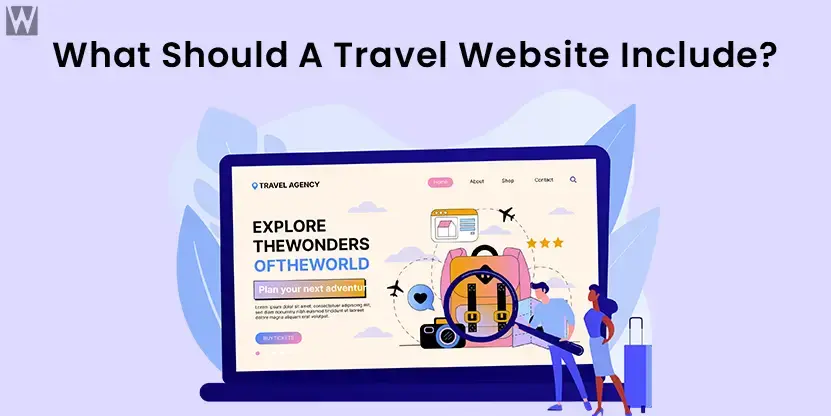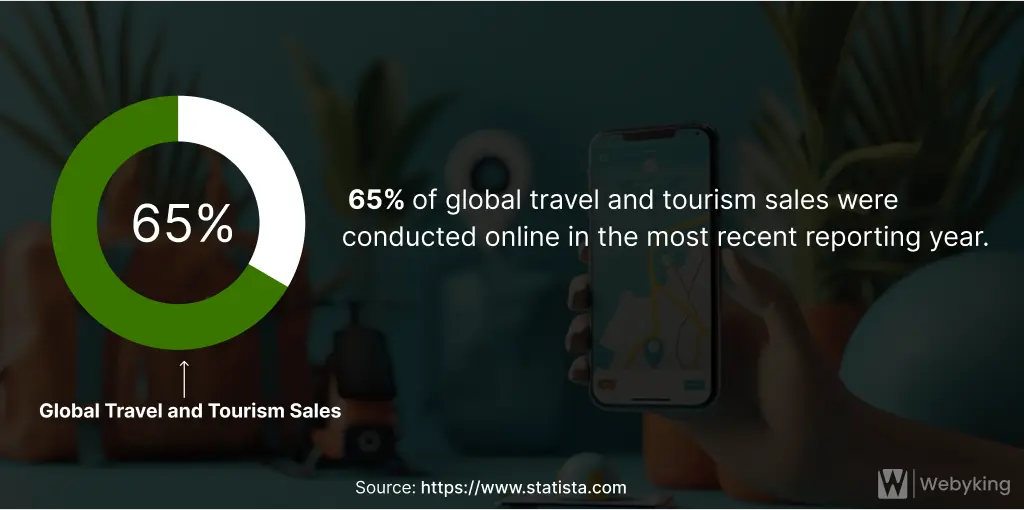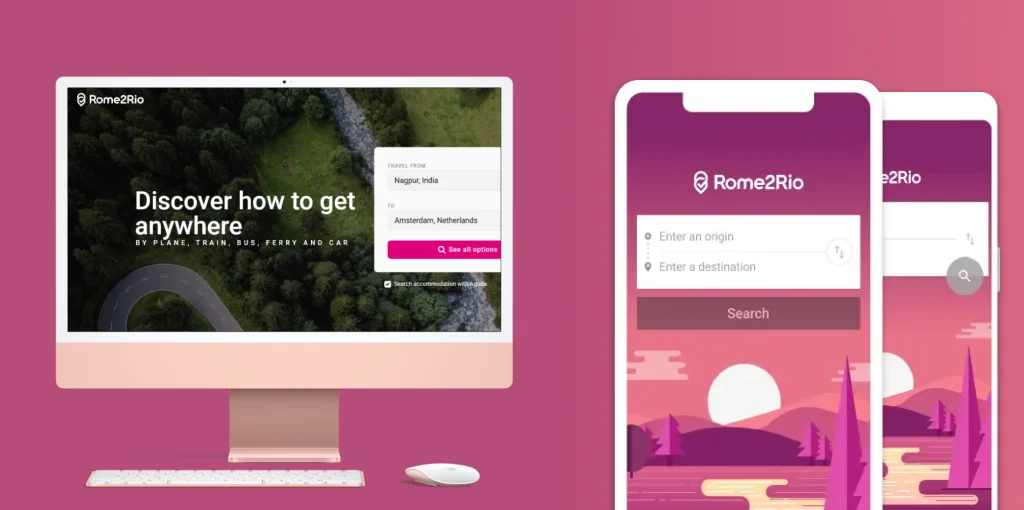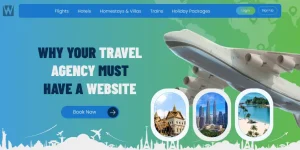Which Features Are Necessary for a Travel Website?

Gone are the days when travelers would rely solely on phone calls to book their next adventure, often without thorough research or comparing options. Today, most businesses have shifted online. Travel bookings and customer interactions have also moved there.
If you love writing about travel, own a travel company, or are in the tourism industry, having a travel website is the need of the hour.
However, simply having attractive destination photos on your travel agency website won’t be enough. Nowadays, Travel lovers are always on the hunt for exciting trips and deals online.
And you need to make sure they find their way to your travel agency website.
With a fully working website that has all the key features, you’ll surely become their top choice. But let’s first understand why travel agencies need a website.
Why Do Travel Agencies Require a Website?
In the past, people used to depend on traditional ways like going to travel agencies or calling them to make travel arrangements. They would talk to travel agents to find out about different places, compare prices, and finalize their plans. But if you’re someone who still believes that offline businesses and people are convenient in the same way then “WAKE UP TO THE REALITY“.
According to Statista’s report, 65% of global travel and tourism sales were conducted online in the most recent reporting year.

Top Reasons Why Every Travel Agency Needs a Website
- A website lets travel agencies attract customers from anywhere. It expands their reach beyond geography.
- Travel agencies can use their website to display their travel services, packages, and destinations. This allows travelers to gather detailed information and make well-informed decisions.
- Websites enable travel agencies to offer online booking and reservation systems. This lets customers conveniently plan and secure their trips.
- They can do this by showing customer testimonials, reviews, and ratings. These help agencies to seem credible and build trust with their target audience.
- Establish a strong online presence.
We’ve discussed the importance of a travel agency having a website. Now, let’s delve into the essential features that a travel website should have.
Travel Website Usage & Booking Trends
Before we dive into the must-have features, let’s look at some eye-opening facts about how travelers plan and book trips today:
- More than 50% of travelers are undecided on a destination when they start planning and often look for inspiration on websites and blogs. (WiT)
- Over 60% of travelers use social media for travel inspiration. (Travolution)
- Around 65% of all travel bookings were made online in 2023 — and by 2029, that number is projected to reach 75%. (TravelPerk)
- Travelers visit an average of 277 different web pages during the 45 days before booking a trip. (Hospitality.today)
- On average, people spend over 5 hours researching options before making a booking. (Hospitality.today)
- 72% of travelers prefer booking online.
- 35% of bookings happen via mobile.
- 22% have already used AI or chatbots like ChatGPT to plan trips.
- 95% say they’d rather cut other expenses than stop traveling.
These numbers clearly show that travelers are spending a lot of time online exploring, comparing, and getting inspired — making a well-designed, informative website a must-have for any travel business.
Let’s collaborate to turn your vision into a reality. Contact us today to schedule a consultation and take the first step toward digital success for your travel business with our expert travel website design services.
Top Features Every Travel Website Should Include
When making a travel agency website, focus on function, looks, and user experience. Whether starting from scratch or updating an existing site, these three aspects should be a priority.
We’ve compiled a list of the essential features that will take your travel website design from average to exceptional.
Hotel Amenities
Offering detailed information about hotel amenities is vital. It provides a seamless booking experience for travelers. A full list of amenities lets users see what facilities each hotel has. This helps them make informed choices based on their preferences.
Key amenities, like pools and beach access, hot tubs, Wi-Fi, and things like golf or parking, can greatly influence travelers. decisions . Display this info prominently on your website. It ensures transparency and helps users find the best hotel for them.
You can utilize Google to fetch these details directly.
Destination Details

- People browse travel websites to discover new places and research potential trips. It has detailed information and Google Maps. They cover destinations, attractions, activities, culture, and things to see and do. These help them decide where to go.
- A well-informed visitor is a happy visitor. Details about destinations make your website valuable. They guide travelers to plan their dream vacation.
- The more a user knows about a destination and how your services can help them experience it. This makes them more likely to book a trip or package through your website.
- Search engines favor websites with rich content. Details about destinations help your website rank higher in search results. They rank higher for travel queries that are relevant.
Activities Page

Give this features in your Travel Website’s Activities Page:
- Search & Filter: Find activities by location, category, date, price, and more.
- Detailed Listings: Clear descriptions, highlights, inclusions, exclusions, and visuals showcase each activity.
- User Reviews & Ratings: Reviews help users make informed decisions based on real experiences.
- Seamless Booking: Book activities directly with a user-friendly interface.
- Interactive Map: See activity locations and plan your itinerary visually.
- Recommendations: Discover new experiences based on your interests.
- Social Sharing & Save: Share activities with friends and save them for later.
Travel Packages with Customized Option (Give as much as Possible)

It is important to have a variety of travel packages on your website for a few reasons. Firstly, it allows you to cater to the different needs and preferences of your audience, which helps you attract a larger customer base. You increase your chances of catching the eye of potential customers and turning them into bookings. You can do this by offering packages for different budgets, destinations, and interests. Include this info in your travel package. Users can easily access it in one place without any hidden details.
- Location Details
- Hotel or Other Accommodation Full Information
- Transportation Options (Flight, Train, Car, or Other)
- Activities and Excursions
- Meals and Dining Options
- Travel Itinerary
- Booking and Payment Details
Search Filters (Place, Check in, Checkout, Guests Number)

Integrating search filters into your travel website has many benefits for both users and your business. Users can narrow down their search by destination, check-in and check-out dates, and the number of guests. This makes it easier for them to find the perfect accommodation or travel package.
This customization raises user satisfaction and engagement. It leads to more sales and return visits. Also, adding search filters can simplify booking. They save users time and effort. While also boost efficiency and drive bookings for your business.
If you prefer not to make a separate page, you have the option to incorporate this feature into your website’s home page. Search filters are crucial. They provide a smooth, tailored browsing experience for travelers.
Easy Navigation

Are you feeling overwhelmed by all these features? Just like you, your website visitors might also get confused. That’s why clear navigation is essential in travel web design.
It is crucial to prioritize easy navigation and responsiveness on your travel website to improve user experience and engagement and make your site SEO-friendly.
Simple navigation helps users explore your site smoothly and find the information or services they need without any hassle. By adding easy menus, clear buttons, and logical site structures, you help visitors navigate your content easily. This leads to higher satisfaction and retention.

Mobile Responsive Design (Mobile Friendly)

Responsive design lets your website adapt to different devices and screen sizes. It offers a smooth experience for users on desktops, laptops, tablets, and smartphones. This adaptability caters to modern travelers’ preferences. It also boosts your site’s visibility on search engines. This leads to more traffic and conversions.
More than 50% of hotel bookings are now made via mobile devices, yet many websites still lose potential customers due to poor mobile optimization, slow loading, or awkward UX. (Hospitality Net)
This shows how vital a mobile-friendly travel website design is for retaining and converting visitors.
Registration and Login

Logging in and signing up are essential components for a travel site, as approximately 80% of travel website features rely solely on this functionality.
Role of Login and Registration on Your Travel Website:
- Users can create accounts to save preferences, manage bookings, and receive travel recommendations based on their history and interests.
- Logins provide secure access to sensitive information like payment details and booking history.
- Easier booking for returning users, encouraging repeat visits and boosting engagement.
Payment Integration and Simple Checkout
Adding payment integration is essential. It ensures a smooth checkout process on your travel website. This is key for giving customers a seamless booking experience. You cater to diverse customer preferences by offering many payment options and also enhance convenience. These include credit cards, debit cards, and online payment gateways.
Adding payment integration ensures security. It helps you and your customers. It provides encrypted gateways that safeguard financial information.
Moreover, a simple checkout process saves users time, making it more likely for them to complete their bookings without frustration or hesitation. By adding payment integration and a simple checkout to your travel website, you improve user experience and also increase security. This drives growth and success for your business.
In addition, prioritizing quick refunds for bookings canceled due to rush or other reasons shows your dedication to customer satisfaction.
Aim to refund customers within 2-5 minutes of payment cancellation. This shows reliability and trust. It helps keep customers and build your brand’s reputation. This is key for lasting success in travel.
Booking Details & Email notification

Send your clients complete booking info in emails and make booking easy for them. Once they finalize a booking on your site, they will instantly get an email. It will confirm their booking and include a detailed PDF with all the booking specifics.
Moreover, you can also send the booking details through WhatsApp for added convenience. By sending booking confirmations quickly, you make customers happier and give peace of mind. This ensures a positive experience from start to finish.
Guides and Information on Visa Requirements

You should offer helpful guides and info on visa rules for different countries on your travel website. This includes what documents they need, processing times, and fees.
This saves time and effort for your customers as they find all visa-related details in one place.
Itinerary Downloader

Offering an itinerary downloader is like giving your travelers a personal assistant in their pocket. It lets them easily save their travel plans as a PDF, perfect for on-the-go access, even without the internet.
They can tweak their plans, jot down notes, and keep everything organized in one place. This not only makes their trip smoother but also boosts your agency’s reputation for providing top-notch service. It’s the little details that keep travelers coming back and spreading the word about your agency.
Transparent and Clear Pricing

Transparent and clear pricing is essential for building trust and confidence with your customers. Here’s how you can implement this on your travel website across various categories:
- Stays: Provide upfront pricing for rooms. This pricing includes the room rate, taxes, and any extra fees. Clearly outline what’s included in the price, such as breakfast, Wi-Fi, or parking.
- Packages: Packages should show prices clearly. They should detail what’s in each package (e.g., flights, rooms, activities). Break down the cost to show customers the value they’re getting.
- Hotels: Present hotel rates clearly, including any discounts or promotions available. Provide information on room types, amenities, and any extra charges.
- Flights: Show flight prices for different routes and dates, with options to filter by airline, departure time, and price range. Include details on baggage fees, seat selection, and any other add-ons.
- Rental Cars: List prices per day or per rental. Include info on vehicle types, insurance, and fuel. Highlight any special offers or discounts.
- Cruises: Display cruise fares upfront, broken down by cabin category and itinerary. Include information on taxes, port fees, and gratuities, as well as onboard amenities and activities.
- Things to Do: Offer clear prices for tours, activities, and attractions. Include clear descriptions of what’s in the price. Specify any age restrictions, cancellation policies, and booking requirements.
Your pricing must be transparent. It must be easy to understand in every category. This gives customers the power to make informed choices and to trust your brand. This openness creates a positive environment for customers, leading to repeat business and referrals.
Blog Page

Adding a blog page to your travel website has many advantages. It lets you share interesting travel stories, guides to different destinations, helpful tips, and valuable industry knowledge. This helps you connect with your audience and create a sense of community.
Moreover, a well-maintained blog improves your website’s SEO, bringing in organic traffic and establishing your brand as a trusted source in the travel industry.
Customer Reviews & Social Media

Incorporating customer reviews and social media features into your travel website has many benefits.
Customer reviews give insights and feedback from past travelers, helping potential customers make informed decisions and trust your brand. Positive reviews can be strong endorsements, while constructive criticism offers chances for improvement.
Adding social media features lets users engage with your website and share their travel experiences with their networks. This boosts brand visibility and creates a sense of community among travelers. Users create content like photos, videos, and testimonials. They share it on social media. It can boost your website’s credibility and inspire others to book confidently.
By adding customer reviews and social media features, you make a lively platform. It encourages engagement, builds trust, and drives bookings for your travel business. This approach drives bookings for your travel business and leverages social media advertising to attract new customers.
Did You Know?
Over 60% of travelers use social media for inspiration during the trip-planning process? (Travolution)
Customer Support

Planning travel can be hard. It involves choosing destinations, arranging packages, making bookings, and managing logistics. Responsive and helpful customer support is crucial. It ensures a seamless experience for users. This boosts the chances of successful bookings.
Quick fixes to problems and helpful guidance in travel planning lead to happy customers. This translates to positive reviews and recommendations, attracting new users. When users know they’ll be taken care of, they’re more likely to return to your website for future travel needs.
Exclusive Deals and Discounts for Accommodations and Attractions

Offering discounts on your travel website can help attract customers. They also boost sales, drive conversions, build loyalty, and keep you competitive. However, it’s crucial to plan your discount offerings to make sure they align with your business goals and profitability targets.
What Happens If You Skip These Features?
Skipping essential features can directly impact user trust, engagement, and booking completion. Here’s how missing features can hurt your performance:
- No Mobile Optimization → Users drop off instantly because 60% book via phone.
- Weak Search Filters → Users struggle to find the right package and leave your site.
- No Transparent Pricing → Users don’t trust final price; booking abandonment increases.
- No Itinerary Download → Users can’t share plans with friends/family.
- Slow Checkout → Drop in conversions due to too many steps.
- No Customer Support → Users hesitate when travel involves risk or uncertainty.
Features You Can Skip When Building a Travel Website on a Budget
While advanced features can enhance your travel website, not every add-on is essential—especially when you’re starting out on a budget. Here are some features that are nice-to-have but can be skipped initially without hurting your user experience:
Flights Booking System (with Airport Pick-up Options) – Useful, but many travelers use external flight platforms.
Hotel Booking System (with Drop-off Options) – Adds convenience, but not critical if you provide curated hotel recommendations.
Vehicle Rentals – Great for full-service travel sites, but optional for small-scale operations.
Travel Insurance Options – Valuable for some customers, but can be added later.
Language Translation Services – Important for global audiences, but you can focus on your primary market first.
These features can boost engagement, but you can always introduce them as your website grows. Start simple, focus on what your travelers really need, and gradually expand.
Unique & Advanced Features to Make Your Travel Website Stand Out
1. AI-Powered Trip Planner
Integrate an AI-based itinerary builder that customizes trips based on user interests, budget, travel dates, and duration.
Example: The user enters “7-day Europe trip under $2000,” and the AI suggests destinations, accommodations, and activities with a booking link.
This feature personalizes the user experience — similar to how tools like Google Travel or TripHobo work.
2. Virtual Tours & 360° Destination Views
Offer interactive 3D tours or 360° images/videos of destinations, hotels, and attractions.
Travelers can explore locations before booking — increasing engagement and reducing hesitation.
You can mention how VR/AR integration helps users experience the destination virtually before they travel.
3. Multi-Currency & Multi-Language Support
Expand your reach globally by enabling users to:
View prices in their local currency
Browse the site in multiple languages
This feature is crucial for international travelers and adds a professional edge.
4. Dynamic Weather & Season-Based Recommendations
Show live weather forecasts and recommend best travel times for each destination.
Example: “Best time to visit Bali – May to September (Dry Season)”
This helps travelers plan smartly and builds your authority as a helpful resource.
5. Loyalty & Referral Programs
Encourage repeat bookings through reward points, member discounts, or refer-a-friend bonuses.
Example: “Earn 500 points for every friend you refer who books a trip.”
It’s a great feature for retention and organic promotion.
6. Social Media Integration with UGC (User-Generated Content)
Take your social section further by allowing travelers to tag your brand or upload their travel photos directly from Instagram or TikTok.
This adds social proof and community-driven content to your website.
7. Interactive Map Search
Add an interactive global map where users can visually click destinations to see available packages, hotel deals, and activities.
Example: A hover-over map that highlights Europe → France → Paris → “3-Day City Tour”.
8. Chatbots or Virtual Travel Assistants
Implement a 24/7 chatbot or AI assistant that answers queries like:
“Show me 5-day packages in Bali under $1500” or “What are the visa requirements for Thailand?”
This boosts engagement, reduces bounce rate, and automates customer service.
9. Trip Cost Estimator
Provide a smart trip cost calculator that estimates total expenses based on:
Destination
Dates
Number of travelers
Accommodation type
Example: “Estimate your 5-day Japan trip cost in 10 seconds.”
It adds interactivity and sets realistic budget expectations.
10. Sustainable & Eco-Friendly Travel Filter
Add an option to filter eco-friendly hotels, green tours, or carbon-neutral trips.
More travelers are now choosing sustainable tourism options — it shows you care about the planet and modern values.
11. Offline Access or “Save Trip” Feature
Allow users to save their bookings, itineraries, and tickets for offline viewing.
It’s convenient for travelers who won’t have internet access during trips.
12. Local Experience Integrations
Partner with local guides, cafes, or event hosts to feature authentic local experiences like food walks, traditional classes, or home stays.
Adds uniqueness beyond typical “tourist spots” and enhances personalization.
13. Real-Time Chat or Video Consultation with Agents
Offer a live chat or video consultation option where users can connect with a travel expert instantly to plan trips or clarify doubts.
It builds credibility and human connection — important for high-ticket trips.
14. Emergency Contact & Travel Assistance Section
Provide quick access to embassy contacts, hospital info, and safety guidelines for every destination.
It shows you care about customer safety and enhances trust.
15. Personalized Dashboard for Users
Give logged-in users a dashboard showing:
Upcoming trips
Past bookings
Saved destinations
Reward points
Travel documents
This creates a smooth, app-like experience and increases engagement.
Standard Travel Sites vs. Optimized Travel Websites
| Feature | Basic Travel Sites | Optimized Travel Sites |
|---|---|---|
| Mobile-Friendly | Not optimized | Fully responsive & fast |
| Smart Search Filters | Limited or none | Filters by location, dates, guests, budget |
| Transparent Pricing | Hidden fees & unclear totals | Clear costs with no surprises |
| Itinerary Download | Not available | Instant PDF download & email |
| One-Click Add-ons | Manual selection | Add car, guide, meals with one click |
| Real Photos | Limited stock images | Verified customer photos & galleries |
| Faster Checkout | 5–7 Steps | 2–3 Step smooth checkout |
| Personalized Packages | No customization | Customizable packages & date flexibility |
| Support Options | Email Only | 24/7 Multi-channel (Chat, WhatsApp, Phone) |
Example of a Perfect User Journey

A traveler lands on your site from Google, filters Miami beach packages, adjusts travel dates, adds airport pickup and hotel upgrades, downloads the itinerary, and confirms the booking — all within 3 minutes.
Once you’re ready, take inspiration from leading travel websites that integrate these features effectively to enhance user experience. Seeing them in action will help you enhance your own travel website and improve the overall user experience.
Real Travel Websites that Implemented These Features

Get Inspired! Check out these travel website examples to discover what makes a great travel site stand out.
Conclusion
With over 45,000 active travel websites competing globally, having a website that stands out with great design, mobile usability, and engaging features isn’t optional — it’s essential.
Building a travel agency website can be a complex task due to the competitive nature of the travel industry. To ensure your website stands out it’s crucial to prioritize the right features from the very beginning. This way, you avoid a lengthy and expensive process down the line.
If you need more guidance on travel web design, schedule a call with our experts and share your project details or address any questions you may have.
Frequently Asked Questions
What Categories Do Travel Websites Typically Fall Into?
Travel websites can be categorized into several different groups depending on their primary function. Here are some of the most common categories:
- Hotel Booking Websites
- Travel Blogs
- Travel Planning and Itinerary Websites
- Flight Booking Websites
- Travel Deals and Discount Websites
- Adventure and Outdoor Travel Websites
- Local Travel Guides
- Cruise Booking Websites
- Travel Forums and Communities
- Review and Rating Websites
How Much Does It Cost To Build a Travel Website?
Developing a basic travel website can cost anywhere from $500 to $3000. But if you add special features, the cost can go up to $5000. Visit our blog for more details on travel website cost.
What Specific Features and Functionalities Should I Add On My Travel Website?
You can choose which features to include based on the type of travel website you want. The features and types of travel websites are listed above to help you decide which ones are essential for your website.
How can small tourism companies compete against large travel platforms?
Small tourism businesses can stand out by focusing on niche experiences and local expertise. Highlight unique tour packages with dedicated landing pages, craft compelling travel stories, and showcase authentic customer experiences. Use targeted content marketing and social media to reach the right audience. Look at examples like Intrepid Travel to see how specialized offerings and storytelling attract loyal travelers.
Which Technical Features Make a Tourism Website Perform Better?
A high-performing tourism website requires strong technical foundations:
Fast-loading pages with optimized images
Accessible design meeting web standards
Structured data markup for better search visibility
Secure online payment gateways
Advanced search and filter options for tours and destinations
Interactive maps for locations and itineraries
Automated booking confirmations and notifications
Integration with travel review platforms
Dynamic content delivery based on seasons or promotions
These features enhance user experience, increase bookings, and improve your website’s credibility.
How Frequently Should I Update My Tourism Website?
Tourism websites must stay current to retain visitors and rank well:
Refresh seasonal promotions and packages every 3–4 months
Update destination guides and content annually
Review tour calendars and availability monthly
Incorporate latest travel trends and events promptly
Regular updates ensure travelers receive accurate information, and your website reflects a professional, active tourism brand.
Which common mistakes should I avoid when designing a tourism website?
Avoid these common pitfalls:
Cluttered layouts that confuse visitors
Slow-loading pages, especially for gallery and booking pages
Complicated booking processes that frustrate users
Generic stock photography instead of authentic visuals
Hidden fees or unclear pricing
Ignoring website analytics, which can identify areas for improvement
Ravi Makhija, the visionary Founder and CEO of WebyKing, is a seasoned digital marketing strategist and web technology expert with over a decade of experience. Under his leadership, WebyKing has evolved into a premier full service web and marketing agency, delivering innovative solutions that drive online success. Ravi’s deep understanding of the digital landscape combined with his passion for cutting-edge technologies empowers him to consistently exceed client expectations and deliver results that matter.















